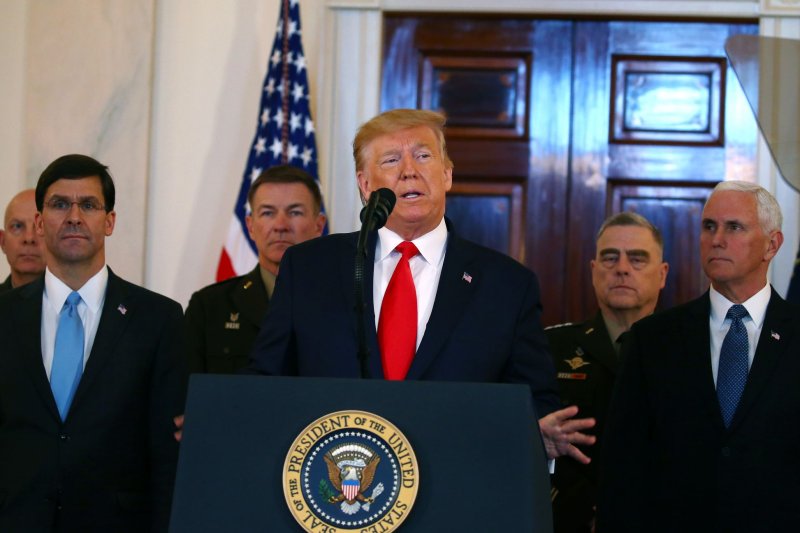In his remarks Wednesday, President Donald Trump was flanked by his national security team, including the joint chiefs, no doubt to demonstrate administration unity. His words ranged from belligerent in tone to exaggerations and misstatement of fact. Photo by Tasos Katopodis/UPI |
License Photo
Following the assassination of Qassem Soleimani last week and Iran's firing in reprisal of 15 ballistic missiles against two bases in Iraq, U.S. President Donald Trump had a perfect opportunity to seize the high ground in his response.
Iran's "retaliation" was minimal and an "olive branch" of sorts. Its missiles were aimed to do little damage and to placate a domestic public outraged by Soleimani's death. Further, Iran telegraphed the attack with warnings to minimize casualties.
But the president chose not to take the high ground. Nor did it seem that he appreciated that Iran was operating from a position of weakness, clearly showing Tehran was interested in negotiations. Instead, the president increased the policy of "maximum pressure" with further sanctions. Perhaps the hawks in his administration have prevailed, assuming that regime change is not out of the question.
In his address, the president was flanked by his national security team, including the joint chiefs, no doubt to demonstrate administration unity. His words ranged from belligerent in tone to exaggerations and misstatement of fact. He began by asserting Iran will never obtain nuclear weapons.
Were that true, Trump would never have withdrawn from the Joint Comprehensive Plan of Action. He then announced even tougher sanctions against Iran and asked NATO to play a bigger role in the region. Given that NATO members are also part of the European Union and thus supportive of the JCPOA, it seems unlikely what NATO could do.
The president asserted that his administration "rebuilt" the U.S. military, having spent $2.4 trillion in that pursuit. Both statements were wrong. And he complimented the power of the American military while signaling that he did not want to use it.
Iran was cited again as the major sponsor of terrorism and Soleimani as the leading terrorist. However, that is not a universal view. And while Iran and the United Stats have many areas of conflict, America's intervention into Iraq in 2003 precipitated the catastrophe engulfing the region.
Optimists will take the lack of an American military response and the president's comments about how Iran could become a great and prosperous state through negotiations as positive signs. But that is not how his words will be viewed in Tehran. Iran's retaliation was an olive branch. Now that it has been rejected, expect repercussions.
The administration's major failing beyond not exploiting the potential opportunity of engineering a breakthrough with Iran as attempted with North Korea was the absence of strategy. After sanctions are imposed, then what? Suppose Iran takes more powerful actions that are plausibly deniable or through proxies. The most likely responses are the use of Iraqi militias to attack installations in Iraq where Americans are stationed. In those circumstances, against whom could Trump retaliate?
Iran's key aim is to force America from the region. In Iraq, the strategy is to turn Iraqis and the government against the United States. How prepared is the United States to respond to these attacks beyond enhancing force protection and deferring the counter-Islamic State missions? And if Baghdad does eject American forces, how will that take place?
No doubt, a collective sigh of relief persists across the international community. For the moment, outright conflict has been deferred. The key word is deferred. This is not a de-escalation. It is a pause in this battle between Washington and Tehran.
What makes this temporary cease-fire even more dangerous is the absence of genuine options to reduce tensions and to allow off-ramps to prevent a regional war. If Iran ratchets up the pressure, as it will, what options does the president have short of using military force?
Lurking and soon to be more prominent is impeachment that will dominate Washington and the president once a trial begins, if it does. Less prominent and still potentially damaging is the question of imminence in killing Soleimani. If, as the caretaker Iraqi prime minister claims, Soleimani was on a diplomatic mission to improve relations with Saudi Arabia, and that can be credibly explained, what does that do to the administration's credibility? Of course, the justification will be that Soleimani was evil. Still, if he were on a diplomatic mission, that cannot be good for the president.
One view is that the situation is akin to someone who has jumped off the top of the Empire State building. Passing by floor 67, when asked "how are things going" the answer was "so far, so good."
My fear is that regarding Trump and Iran, "so far so good."
Harlan Ullman is UPI's Arnaud de Borchgrave Distinguished columnist and a senior adviser at the Atlantic Council. He served as a professor of military sttrategy at the National War College and the Naval War College. His latest book is "Anatomy of Failure: Why America Has Lost Every War It Starts." Follow him @harlankullman.















